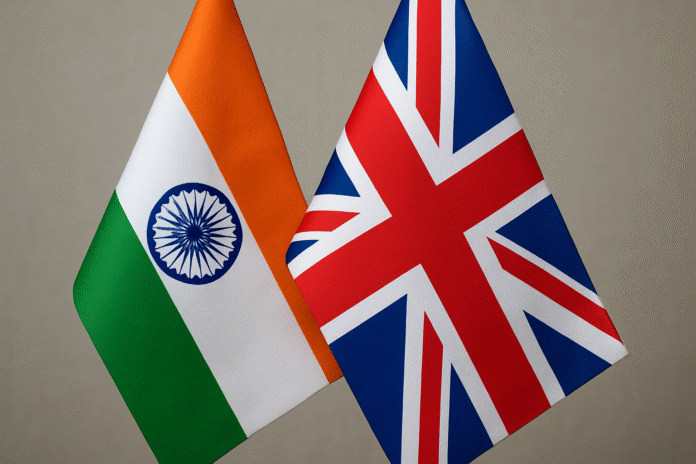In a significant diplomatic and economic milestone, India and the United Kingdom officially signed a long-awaited Free Trade Agreement (FTA) on July 24, 2025. The pact, hailed by Prime Minister Narendra Modi as a “historic turning point,” is expected to transform bilateral trade by granting duty-free access to a wide range of Indian goods while opening new opportunities for Indian farmers and exporters.
The agreement was signed during Modi’s official visit to London, where he met with UK Prime Minister Keir Starmer. The leaders described the deal as mutually beneficial, promising to strengthen ties between two of the world’s major economies.
According to the provisions of the agreement, nearly 99 percent of Indian export items will now enjoy zero-duty access to the UK. These include sectors such as textiles, engineering goods, spices, marine products, jewellery, and footwear. At the same time, around 90 percent of UK goods entering India will benefit from phased tariff reductions, with approximately 85 percent of those becoming entirely duty-free within the next 10 years.
Crucially, India ensured the protection of its sensitive domestic sectors by excluding items such as dairy products, apples, edible oils, and oats from any tariff concessions. This move comes in response to concerns raised by Indian farmers and food producers, who feared potential market disruption from cheaper imports.
The Indian government has emphasized that the FTA offers unprecedented export potential for the country’s agricultural and processed food sectors. Products such as turmeric, mango pulp, ground spices, pulses, tea, seafood, fruit-based products, and ready-to-eat meals will now face minimal to no tariffs in the UK market. Sectors in Andhra Pradesh, Kerala, Odisha, and Tamil Nadu, particularly marine exporters dealing in shrimp and tuna, are expected to benefit significantly from the duty relief.
Government projections estimate that India’s agricultural exports to the UK could rise by over 20 percent in the next three years. The move is aligned with India’s broader goal of achieving $100 billion in agri-exports by 2030.
Apart from agriculture, the agreement has also extended benefits to the services sector. A Double Contribution Convention signed alongside the FTA ensures that Indian professionals working short-term assignments in the UK will not be required to pay into the British social security system. This provision is expected to benefit over 60,000 Indian workers in sectors like IT and consulting, potentially saving them up to 20 percent of their income.
Mobility provisions in the agreement will allow easier short-term visas for business visitors, yoga professionals, and artists. The UK has also committed to streamlined customs processes, reduced regulatory barriers, and greater cooperation in intellectual property rights, although concerns remain among British pharmaceutical firms about limited gains on patent data protections.
Trade analysts suggest that the FTA could boost annual bilateral trade by more than £25 billion by 2040, adding up to £5 billion to the UK’s GDP and generating new business and employment opportunities in both countries. The UK views the deal as a significant step toward building deeper ties with Indo-Pacific economies in the post-Brexit era, while India considers it part of its ongoing efforts to diversify trade partners and strengthen export-led growth.
The signing of the agreement also reflects a shared commitment to democratic values and a rule-based global trading system. Both leaders have indicated that the FTA will serve as a foundation for expanded cooperation in digital trade, clean energy, and supply chain resilience in the years ahead.
Despite these promising developments, some Indian farmer unions and trade bodies have expressed cautious optimism. While they welcomed the exclusion of certain sensitive items, they have urged the government to remain vigilant in monitoring the influx of foreign goods that could affect local market prices and small-scale producers.
In response, Prime Minister Modi reassured stakeholders that national interests were fully safeguarded during negotiations, and that the FTA was designed to be inclusive, equitable, and future-ready.
As the two countries embark on a new era of trade relations, the India–UK FTA stands as a landmark achievement—offering Indian farmers, entrepreneurs, and exporters a wider global stage while reinforcing strategic and economic bonds between two historic partners.

























